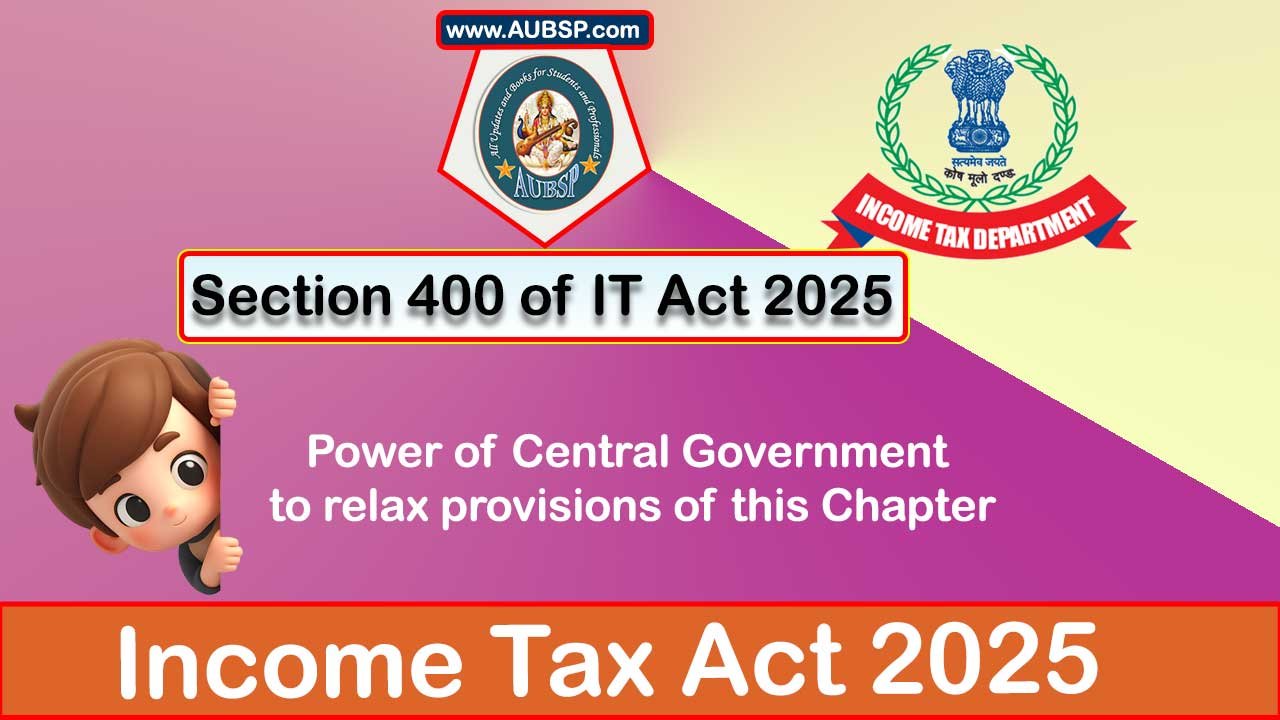Power of Central Government to relax provisions of this Chapter
[Section-400 as per the Income Tax Act, 2025 (this Act) w.e.f. 1st April, 2026.]
Section 400(1) of Income Tax Act 2025
400(1) The Central Government may, by notification provide that deduction or collection of tax shall not be made or is to be made at such lower rate, from such payment or receipt and in respect of such person or class of persons.
Section 400(2) of Income Tax Act 2025
400(2) The Board may issue guidelines with the previous approval of the Central Government, to remove any difficulty arising in giving effect to the provisions of this Chapter and these guidelines shall be laid before each House of Parliament.
Section 400(3) of Income Tax Act 2025
400(3) The Board may notify, a class of person, or cases, where the person responsible for paying to a non-resident, not being a company, or to a foreign company, any sum, to make an application in such form and manner as prescribed to the Assessing Officer, to determine the appropriate proportion of sum chargeable in the manner as prescribed, and accordingly tax shall be deducted under section 393(2) (Table: Sl. No. 17) on that proportion of the sum which is so chargeable.
Section 400(4) of Income Tax Act 2025
400(4) The Board may by notification, make rules specifying the cases in which, and the circumstances under which, an application may be made for grant of a certificate under section 395(1) to (3), and the conditions subject to which such certificate may be granted and providing for all other matters connected therewith.
FAQs on Section 400 of Income Tax Act 2025
What is the purpose of Section 400 of the Income Tax Act, 2025?
Section 400 empowers the Central Government and the Board to provide relief or flexibility in the deduction or collection of tax under this Chapter by issuing notifications, guidelines, or rules to address specific circumstances or difficulties.
What authority does the Central Government have under Section 400(1)?
The Central Government may issue a notification stating that tax deduction or collection shall either not be made or shall be made at a lower rate for specific payments or receipts and for specified persons or classes of persons.
Can the Central Government exempt certain transactions from tax deduction entirely under Section 400(1)?
Yes, the Central Government has the power to exempt certain payments or receipts from tax deduction or allow deduction at a reduced rate through a notification.
What is the role of the Board under Section 400(2)?
The Board can issue guidelines, with prior approval from the Central Government, to resolve any difficulties in implementing the provisions of the Chapter. These guidelines must be laid before both Houses of Parliament.
Are the guidelines issued by the Board under Section 400(2) legally binding?
Yes, once approved by the Central Government and laid before Parliament, these guidelines are binding for the purpose of removing implementation difficulties.
What does Section 400(3) empower the Board to do regarding non-resident payments?
The Board may notify classes of persons or cases where the person making payment to a non-resident or foreign company must apply to the Assessing Officer to determine the chargeable portion of the sum for the purpose of deduction under section 393(2).
What is the purpose of making an application under Section 400(3)?
The application is to determine the appropriate proportion of a payment that is chargeable to tax so that tax is deducted only on that portion under section 393(2).
Who is required to apply under Section 400(3)?
A person responsible for paying any sum to a non-resident (not being a company) or a foreign company, in notified cases or for notified classes of persons, must apply to the Assessing Officer.
What is the relevance of Sl. No. 17 in Table under Section 393(2) in Section 400(3)?
It refers to the specific entry in the deduction table under section 393(2) that applies when tax is deducted on the determined chargeable proportion of the sum paid to non-residents or foreign companies.
What does Section 400(4) authorize the Board to do?
Section 400(4) allows the Board to notify rules about applications for certificates under section 395(1) to (3), the conditions for granting such certificates, and all related matters.
What is the function of a certificate under section 395(1) to (3) as per Section 400(4)?
The certificate provides relief from tax deduction or collection in certain cases. Section 400(4) enables the Board to frame rules around how these certificates can be applied for and granted.
Can rules under Section 400(4) vary depending on the case or person?
Yes, the Board can specify different conditions and circumstances for different cases or classes of persons through notification.

